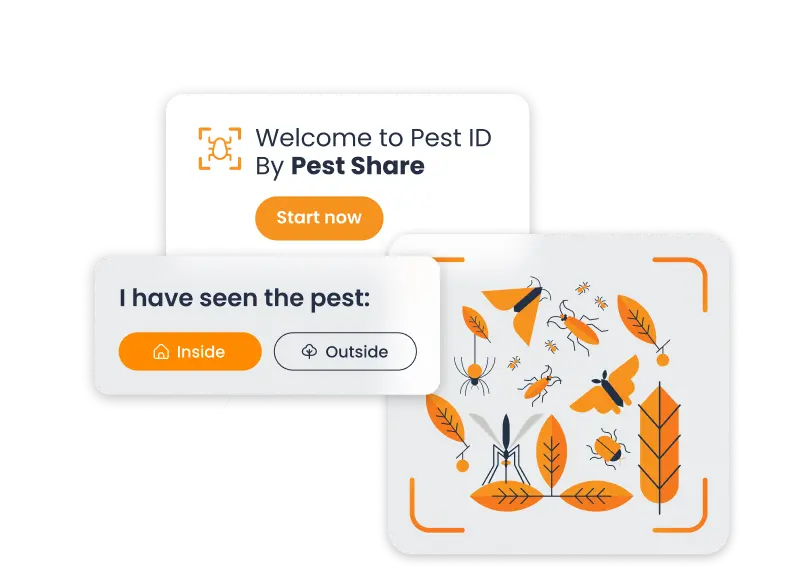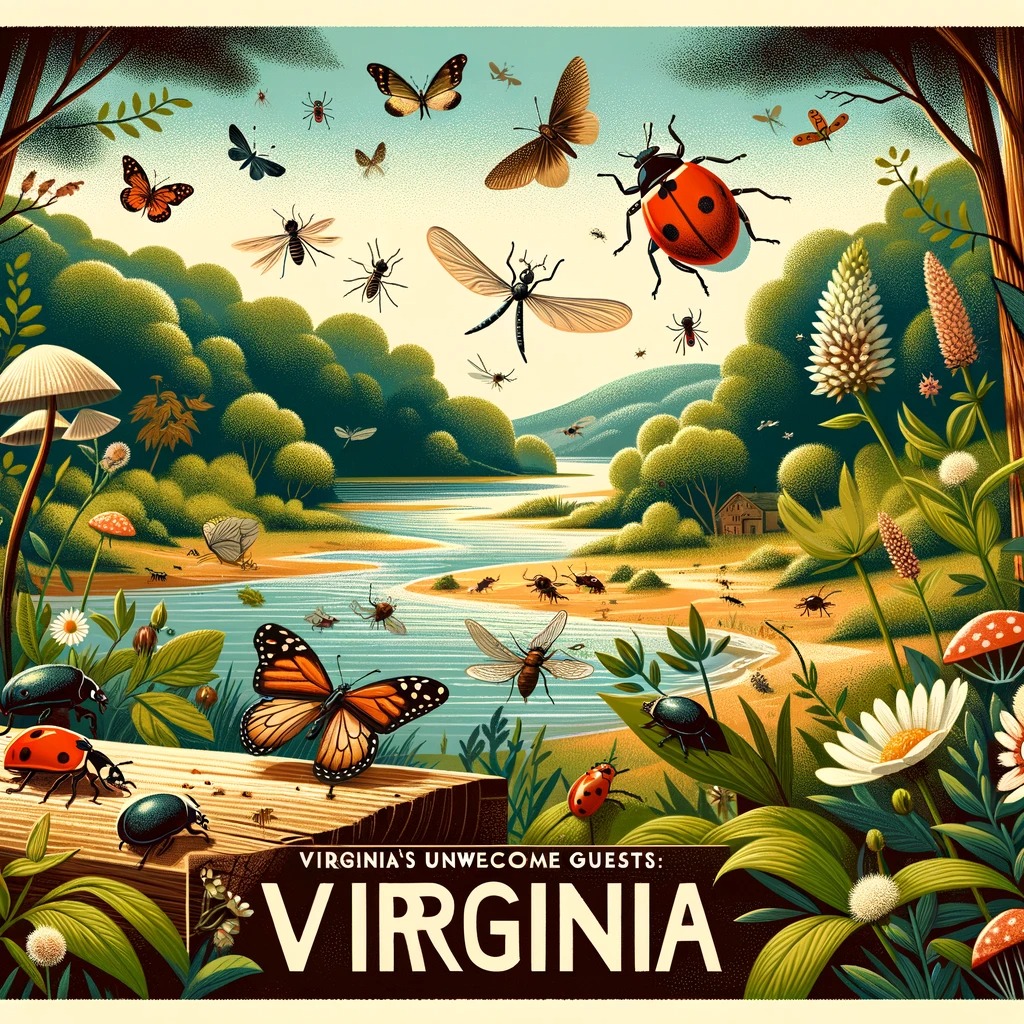Picture this: you’re relaxing in your garden on a sunny Virginia afternoon, but instead of peace, you find yourself swatting away at incessant bugs. Such is the daily reality for many in the Old Dominion, where a variety of insects thrive in its varied climates. This guide will navigate you through the world of Virginia’s most common bugs, providing key insights into their behaviours and habitats. Whether you’re in a suburban home or living it up at the beach, understanding these bugs is crucial in reclaiming your space from these unwelcome guests.
Don’t let pests take over your home! Act now and schedule a professional pest control service to get rid of unwanted guests through a hassle-free portal. This Pest ID software lets you request help from the experts without login details to give you a fast and efficient service.

Smarter Pest Control, Fewer Headaches.
Most Common Bugs in Virginia
Virginia, with its varied climate and landscapes, is home to a diverse array of bugs. The most common ones include:
Stink Bugs:
Known for their distinctive shield shape and unpleasant odour when crushed, these bugs are often found in gardens and sometimes wander into homes.
Eastern Tent Caterpillars:
Common in wooded areas, these caterpillars are known for their communal silk nests in trees. They can defoliate trees but are generally harmless to humans.
Japanese Beetles:
These shiny, metallic bugs are not native to Virginia but have become prevalent. They feed on a variety of plants, often causing significant damage to gardens.
Carpenter Bees:
Large, resembling bumblebees, these solitary bees are known for drilling into wood to lay their eggs, which can cause structural damage over time.
Mosquitoes:
Thriving in Virginia’s humid summers, mosquitoes are a constant nuisance, especially near stagnant water bodies. They are also carriers of various diseases.
Each of these bugs has adapted to the state’s environment, making them a recurring part of life in Virginia.
Bugs in Virginia Beach
Virginia Beach, a popular coastal destination, hosts its own unique set of bug challenges. The warm, moist environment is ideal for:
Sand Fleas:
Often found in beach areas, these tiny creatures can bite, causing irritation and discomfort.
Palmetto Bugs:
A type of large cockroach, often seen scurrying in damp, dark areas and can be quite alarming due to their size.
Greenhead Flies:
Known for their painful bites, these flies are particularly active during the day and are common in marshy areas near the beach.
Tourists and residents should be prepared for these pests, especially during the warmer months when their activity peaks.
Bugs That Bite in Virginia
Among Virginia’s varied bug population, some are notorious for their bites. Understanding which bugs bite and how to deal with them is crucial:
Black Widow Spiders:
Easily recognizable by the red hourglass shape on their abdomen, their bites can be dangerous and require immediate medical attention.
Brown Recluse Spiders:
Less common but still present in Virginia, their bites can cause serious wounds and also require medical attention.
Ticks:
Common in wooded areas, ticks can attach to humans and pets, potentially transmitting diseases like Lyme disease.
Chiggers:
Tiny mites that cause itchy, red bumps, often encountered in grassy or wooded areas.
Fire Ants:
Their stings are painful and can cause allergic reactions in some individuals.
For most bug bites, immediate cleaning of the area and over-the-counter treatments suffice. However, for more severe reactions or bites from dangerous species like black widows, seeking medical help is necessary.
Common Virginia Insects
Virginia’s landscape hosts a variety of common insects that are integral to the local ecosystems but can often become pests in human habitats:
Ladybugs:
While beneficial in gardens for controlling aphids, ladybugs can invade homes in large numbers, seeking warmth during colder months.
Boxelder Bugs:
Recognizable by their black and red markings, these bugs swarm homes in the fall but are mostly harmless.
Cicadas:
Known for their loud mating calls, cicadas are prevalent, particularly during their mass emergence years.
Eastern Tiger Swallowtail:
This striking yellow and black butterfly is common in Virginia and is a joyous sight in gardens.
Praying Mantises:
Fascinating predators, mantises are beneficial for controlling other insect populations but can also turn to beneficial bugs in gardens.
While most of these insects are harmless and even beneficial, their presence in large numbers can be overwhelming and sometimes require management.
Types of Flies in Virginia
Flies, often seen as pests, are a common part of Virginia’s bug population. Some of the most common types include:
House Flies:
Ubiquitous and persistent, these flies are attracted to all types of food waste and can spread diseases.
Fruit Flies:
Small and red-eyed, they are particularly attracted to fermenting fruits and vegetables.
Horse Flies:
Larger than the common house fly, they have painful bites and are often found near livestock or in rural areas.
Drain Flies:
Small, moth-like flies that breed in the sludge of drains and can be a sign of plumbing issues.
Gnat:
These tiny flies, often found in swarms, can be a nuisance in both indoor and outdoor settings.
Controlling flies typically involves maintaining cleanliness, especially in disposing of food waste, and using traps or insecticides where necessary.
House Centipede Virginia
The house centipede, a common sight in Virginia homes, evokes a variety of reactions. These multi-legged creatures, while startling in appearance, are generally harmless to humans and beneficial in controlling other pests:

Appearance:
House centipedes have long, slender bodies, up to 1.5 inches long, with 15 pairs of speedy legs, making them quite efficient predators.
Diet:
They primarily feed on other insects, such as cockroaches, moths, flies, and silverfish, making them natural pest controllers.
Habitat:
Preferring moist and protected environments, they are often found in basements, bathrooms, and under sinks.
Control:
To manage house centipedes, reduce moisture in homes through dehumidifiers and fix any water leaks. Sealing cracks and crevices can also prevent their entry.
While their appearance can be unnerving, house centipedes are beneficial for controlling other insect populations. However, if their presence becomes overwhelming, professional pest control services may be needed.
Preventing and Managing Bug Infestations
Living in harmony with nature in Virginia sometimes means taking steps to keep the bug population under control in our living spaces:
Seal Entry Points:
Check for cracks and openings around doors, windows, and foundations, and seal them to prevent bugs from entering.
Manage Moisture:
Many bugs are attracted to moisture. Fix leaky faucets, ensure good drainage, and use dehumidifiers in damp areas of your home.
Keep It Clean:
Regular cleaning helps prevent infestations. Pay special attention to kitchens and dining areas, where crumbs and food spills can attract bugs.
Check out our post about common signs of infestations.
Proper Waste Management:
Securely store food and dispose of garbage regularly. Compost bins and outdoor trash cans should be sealed and located away from the house.
Landscaping Maintenance:
Keep bushes and trees trimmed back from the house. Remove any yard debris where bugs could nest or hide.
Use of Insect Repellents and Barriers:
Consider using natural repellents like essential oils or chemical insecticides as a barrier. Always follow safety guidelines when using any pesticides.
While these steps can significantly reduce the likelihood of bug infestations, sometimes professional help is needed, especially when dealing with persistent or large-scale problems.
Conclusion
Virginia’s diverse bug population is a testament to its rich natural heritage. While many of these bugs are harmless and even beneficial, managing them in our living spaces is crucial for comfort and health. For those challenging infestations or for peace of mind in your Virginia home, Pest Share is ready to help. Reach out to us for expert advice and effective, environmentally friendly pest control solutions. Say goodbye to unwelcome guests and enjoy the beauty of Virginia bug-free!





